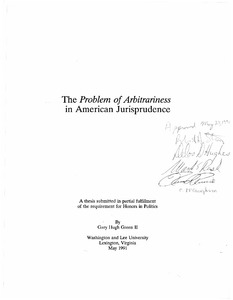| dc.rights.license | In Copyright | en_US |
| dc.creator | Green, Gary Hugh | |
| dc.date.accessioned | 2023-10-20T18:01:21Z | |
| dc.date.available | 2023-10-20T18:01:21Z | |
| dc.date.created | 1991 | |
| dc.identifier | WLURG038_Green_thesis_1991 | |
| dc.identifier.uri | https://dspace.wlu.edu/handle/11021/36511 | |
| dc.description.abstract | The debate over how to interpret the United States Constitution continues to be the most controversial one in the area of constitutional law. In recent years, with the rise of the New Right and its so-called original intent jurisprudence, the dispute has become even more acute. The controversy was publicized in 1985 by then Attorney General Edwin Meese when he criticized the methodology of Justice William Brennan who, before his retirement in the summer of 1990, was the Supreme Court's leading liberal.[1] Brennan was equally scathing in his reply, calling original intent "arrogance cloaked as humility."[2] In addition, the number of articles and books on constitutional interpretation has increased dramatically over the past decade. The importance of the debate over the proper method of constitutional interpretation is not, however, limited merely to academic circles: some theory of judicial review, whether explicitly acknowledged or only implicit, must guide a judge's decision making. As Erwin Chemerinsky, a law professor at the University of Southern California, points out, "In Supreme Court opinions, interpretive approaches are often openly discussed and frequently decisive in explaining the results of particular cases."[3] And the manner in which courts -- especially the Supreme Court -- decide cases can have major implications for the rights we possess as citizens of this country. Cases such as Brown v. Board of Education and Roe v. Wade have drastically affected the lives of countless Americans. Thus, an inquiry into what constitutes the correct approach to constitutional interpretation is of great significance, both intellectually and practically. This essay is intended to be such an investigation. [From Introduction] | en_US |
| dc.format.extent | 90 pages | en_US |
| dc.language.iso | en_US | en_US |
| dc.rights | This material is made available for use in research, teaching, and private study, pursuant to U.S. Copyright law. The user assumes full responsibility for any use of the materials, including but not limited to, infringement of copyright and publication rights of reproduced materials. Any materials used should be fully credited with the source. | en_US |
| dc.rights.uri | http://rightsstatements.org/vocab/InC/1.0/ | en_US |
| dc.subject.other | Washington and Lee University -- Honors in Politics | en_US |
| dc.title | The Problem of Arbitrariness in American Jurisprudence | en_US |
| dc.type | Text | en_US |
| dcterms.isPartOf | WLURG038 - Student Papers | en_US |
| dc.rights.holder | Green, Gary Hugh | en_US |
| dc.subject.fast | Arbitration (Administrative law) -- U.S. states | en_US |
| dc.subject.fast | Constitutional law | en_US |
| local.department | Politics | en_US |
